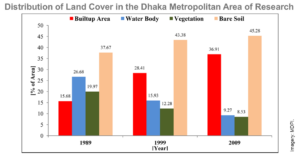 Despite research that has been conducted elsewhere, little is known, to-date, about land cover dynamics and their impacts on land surface temperature (LST) in fast growing mega cities of developing countries. Landsat satellite images of 1989, 1999, and 2009 of Dhaka Metropolitan (DMP) area were used for analysis. The study first identified patterns of land cover changes between the periods and investigated their impacts on LST; second, applied artificial neural network to simulate land cover changes for 2019 and 2029; and finally, estimated their impacts on LST in respective periods. Simulation shows that if the current trend continues, 56% and 87% of the DMP area will likely to experience temperatures in the range of greater than or equal to 30 °C in 2019 and 2029, respectively.
Despite research that has been conducted elsewhere, little is known, to-date, about land cover dynamics and their impacts on land surface temperature (LST) in fast growing mega cities of developing countries. Landsat satellite images of 1989, 1999, and 2009 of Dhaka Metropolitan (DMP) area were used for analysis. The study first identified patterns of land cover changes between the periods and investigated their impacts on LST; second, applied artificial neural network to simulate land cover changes for 2019 and 2029; and finally, estimated their impacts on LST in respective periods. Simulation shows that if the current trend continues, 56% and 87% of the DMP area will likely to experience temperatures in the range of greater than or equal to 30 °C in 2019 and 2029, respectively.
Ahmed, Bayes, Md. Kamruzzaman, Xuan Zhu, Md. Shahinoor Rahman, and Keechoo Choi. "Simulating Land Cover Changes and Their Impacts on Land Surface Temperature in Dhaka, Bangladesh". Remote Sensing. November 15, 2015. https://www.mdpi.com/... (Contributed by Gregory Autin).
Posted on 16/12/24
Recent Abstracts
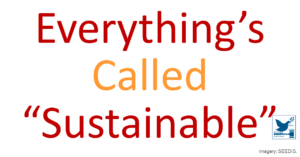
Buzzwords and Fuzzwords: Deconstructing Development Discourse
There are sustainable cities, economics, construction, destruction, investing, operation, and, inevitably, consultants – “There is nothing, it seems, that cannot be called ‘sustainable’”. A correct understanding of the term is important in the processes of policy-making and socioeconomic development as it has become a ...
Posted on 07/05/24
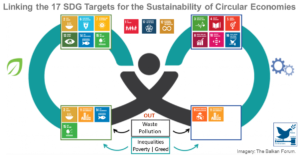
Accelerating Circular Economy Solutions to Achieve the 2030 Agenda for Sustainable Development Goals
A reduction of environmental and socioeconomic impacts of products and services can be achieved through a circular economy as a critical enabler of the sustainable use of natural resources. Systematic materials cycling for closed-loop resource supply chains and the integration of resource circularity with the SDGs is ...
Posted on 06/05/24
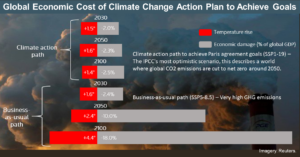
The Economic Commitment of Climate Change
Even if CO₂ emissions were drastically reduced immediately, the global economy would still be heading towards a significant drop of 19% in GDP by 2050, according to a recent study published in Nature. Scientists at the Potsdam Institute for Climate Impact Research (PIK) assessed future impacts of changing climatic con ...
Posted on 03/05/24
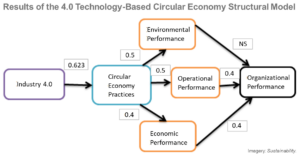
Technological Revolution and Circular Economy Practices: A Mechanism of Green Economy
Business models are being transformed by rising environmental concerns, Industry 4.0 technologies, and circular economy (CE) practices, which are the prevailing business considerations. Keeping these considerations in view, this work looks into the role of Industry 4.0 technologies in the adoption of CE practices and ...
Posted on 29/04/24

Circular Economy – Principles for Buildings Design
Circular economy principles for sustainable building design stress resource efficiency in construction to prevent and reduce construction and demolition waste and to re-use and recycle building materials and products. This document informs the key participants in the building value chain about sustainable building des ...
Posted on 26/04/24
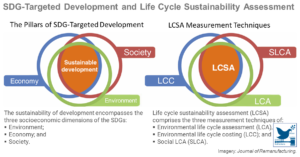
Life Cycle Costing: Evaluate Sustainability Outcomes for Building and Construction Sector
Life-cycle cost (LCC) is the sum of all costs related to the life cycle of a building from investment to its deconstruction. For a sustainable building, it is anticipated that the environmental impacts associated with the design, construction, and operation of this building are lower than conventional construction. L ...
Posted on 25/04/24
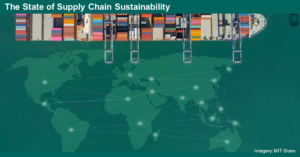
The state of supply chain sustainability
This report published by MIT Sloan defines supply chain sustainability as “the management of environmental and social impacts within and across networks consisting of suppliers, manufacturers, distributors, and customers.” The five key takeaways from the report, which captures a turbulent world that continues to grappl ...
Posted on 24/04/24
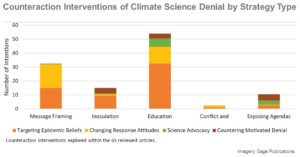
Counteracting climate denial: A systematic review
Despite overwhelming scientific consensus on climate change, climate denial is still widespread. While much research has characterized climate denial, comparatively fewer studies have systematically examined how to counteract it. This review fills this gap by exploring the research about counteracting climate denial, ...
Posted on 23/04/24

ESG Investing isn’t Designed to Save the Planet
Erroneously, ESG (environmental, social, and governance) investing is widely assumed to reward companies for helping the planet. However, ESG ratings, which underlie ESG fund selection, are based on the impact the changing world has on companies’ profit and loss. Asset managers have deliberately allowed the confusion ...
Posted on 22/04/24
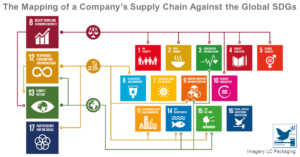
SDG-Oriented Supply Chains: Business Practices for Procurement and Distribution
Sustainable practices can be implemented within supply chains to support the Sustainable Development Goals (SDG). Procurement and distribution processes can be reengineered by implementing sustainable approaches that consider the environmental, social and economic dimensions of sustainability. SDG-oriented supply cha ...
Posted on 18/04/24
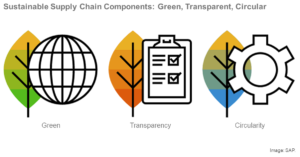
What Is a Sustainable Supply Chain?
A sustainable supply chain fully integrates ethical and environmentally responsible practices into a competitive and successful model. End-to-end supply chain transparency is essential for companies to demonstrate corporate social responsibility. Sustainability initiatives must extend from raw materials sourcing to l ...
Posted on 18/04/24
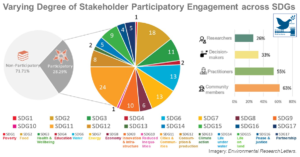
A Review of Systems Modelling for Local Sustainability
The SDGs are a holistic agenda intended to guide socioeconomic development policies and priorities, funding and government interventions at international, national, and local levels for their achievement. To counter destructive non-linear system responses, tipping points, and spillover effects, the 17 Sustainable Deve ...
Posted on 11/04/24
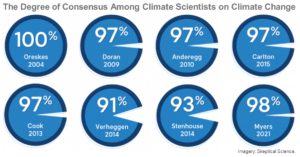
The 97% consensus on global warming
Despite claims to the contrary, 97% of climate experts agree that humans are causing global warming. In science, consensus is when the vast majority of experts agree on a fundamental principle. In climate science, more than 97% of experts agree that CO₂ traps heat and that adding it to the atmosphere warms the planet ...
Posted on 08/04/24

Legal Rights of Nature
Resulting from the Rights to Nature movement, Mount Taranaki on New Zealand's north island was granted rights equal to those of a human and assigned legal personhood in 2017. The Universal Declaration of Human Rights was adopted in 1948, enabling the protection and recognition of each person. Some say we need such ri ...
Posted on 01/04/24
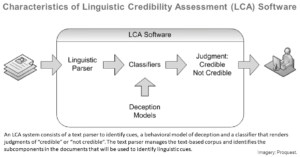
Deception Detection in Conversations Using the Proximity of Linguistic Markers
Deception and fraud detection is a very challenging task. Detecting the elements of deception in a conversation takes years of study and experience. It is a skill set primarily used in law enforcement agencies. For the average person, the ability to detect a lie is only slightly greater than chance, with about 54% a ...
Posted on 03/03/24

